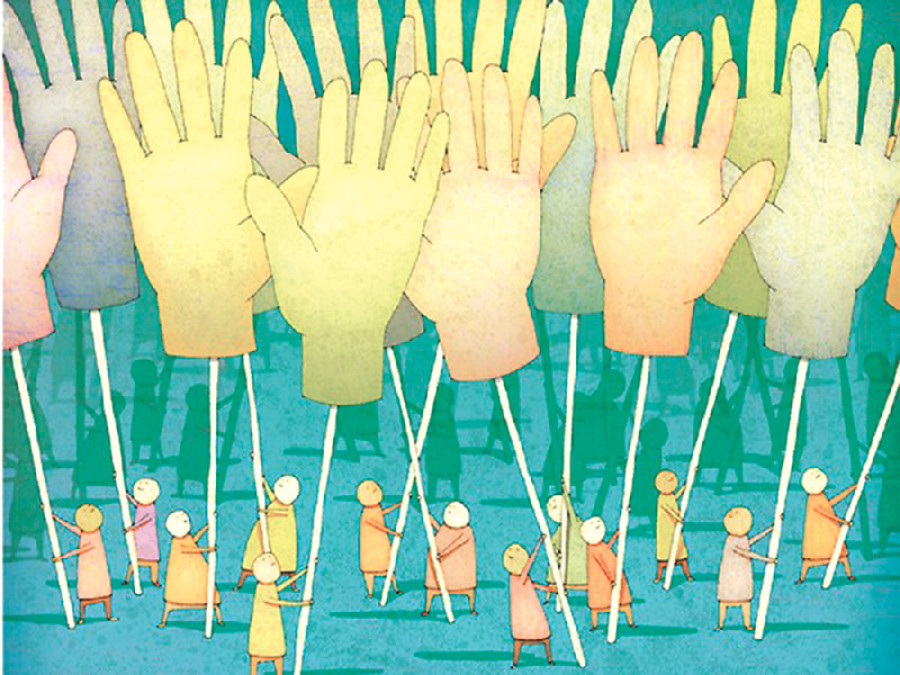Opinion
A service nation
Volunteerism can motivate millions of people to solve the most challenging issues facing their communities
Yesterday the world marked the International Volunteer Day, a special occasion to acknowledge the spontaneous gestures and acts of millions of citizens of all ages and stripes in all the corners of the planet.
At a time when people in both the global north and the south are becoming more and more disillusioned with the way institutions and systems work, we should not be surprised that the Eldman Global Trust Barometer 2016 shows an increasing divide among people in relation to the way institutions are generally trusted. The study talks about “inequality of trust” through which common citizens are losing their confidence in institutions that play a fundamental role in their lives.
This is the reason why the theme of this year’s International Volunteer Day “#GlobalApplause—give volunteers a hand” could not have been more fitting to respond to the challenges that humanity currently faces. Recognising and acknowledging the achievements of volunteers, the theme supports the idea that volunteerism is a real empowerment agent that, while often neglected, can motivate millions of people to solve the most challenging issues, impact social cohesion locally in positive ways and make communities more united.
Deeply ingrained in Nepal
Citizens, if adequately supported in delivering civic actions in their own communities as well as outside their own respective countries, can play an important role in making societies better places to live, especially for those in vulnerable areas. By applauding the acts of volunteers around the world, we take an important step towards raising the profile of volunteerism. As such, we are calling for more attention and additional resources to truly harness its positive effects.
We are pitching for a quantum leap to make it easier for people, of all genders, abilities and economic status, to contribute to society. Richard Dictus, the outgoing Executive Coordinator of United Nations Volunteers, says, “Volunteerism gives communities hope; it gives structure when there is none; it provides critical resources to the communities and countries that need them the most.”
These words ring very true for Nepal. In this country, supporting volunteerism should not be that difficult. After all, the nation counts on one of the highest levels of social capital with traditions of self-help and community services that are well ingrained locally.
With the country moving towards a federal set-up and amid discussions on how to restructure the local bodies, we should not forget that local citizens can often make the difference in ways programmes and services are delivered and implemented. Here, we are not just talking about their role in increasing the level of public accountability, but also about direct contributions volunteers can make while running activities of common interest.
Just imagine a community where you live without the presence and activism of volunteers. Think about the ways local groups are active in your wards such as student groups organising health and cleaning campaigns or a group of elders supporting the development of the local community school.
You will soon realise that you are surrounded by people who might not call themselves volunteers, but are nevertheless contributing to the prosperity of your community. They are motivated by a strong sense of purpose and an unselfish desire to do whatever is in their power to improve the community they are a part of.
A tool for development
With the government working towards the formulation of its Vision 2030, an ambitious blueprint to help the nation leapfrog towards a new phase of national development and reconstruction, there is an urgent need to work at the policy level to embed volunteerism in national development plans.
Volunteerism, as a tool, can directly contribute to all of the Sustainable Development Goals. From gender equality and resilient communities to enhanced quality education and the creation of a national health system, citizens acting as volunteers can truly make a difference, not by replacing actions of state or non-state actors but by complementing them.
Most importantly, everybody, including persons with disabilities and other vulnerable groups, can and should contribute and be part of this bottom-up “call for actions” to improve communities across the nation. We need to create a stronger volunteering architecture around the country from the grassroots up to the provinces and the centre. We have to make it easier for people to volunteer and directly contribute to national development.
It is not only an issue of resources to be dedicated specifically to nourish volunteering actions, but also about changing attitudes, and designing and developing cross-sectorial programmes that have volunteering components integrated and acknowledged. This also requires strong leadership with proper regulations and policies that would help develop volunteerism not as a standalone or niche sector, but rather as an integral element within the existing development framework of the Nepal government.
We need new coalitions to bring the government to work together with non-state actors and its people in a tripartite alliance at different levels for national prosperity. The private sector obviously has an important role to play, but it has a lot of catching up to do with the global best practices of companies promoting employers’ volunteering programmes, not as tokenism but to make an actual difference.
Yesterday we started a long journey in harnessing the power of volunteerism by recognising the gestures of all volunteers across the nation. In a special conference organised by all volunteer-sending agencies with great support from their partners, discussions were focused on the roles and contributions made by volunteers in achieving the Sustainable Development Goals. We even applauded the most significant examples of volunteerism through the first edition of the National Volunteer Award. The conference and the award constitute two small but important steps in bringing volunteerism back at the centre of development action.
Voss is UNV Programme Officer; Galimberti is the co-founder of ENGAGE and editor of Sharing4Good




 18.12°C Kathmandu
18.12°C Kathmandu









